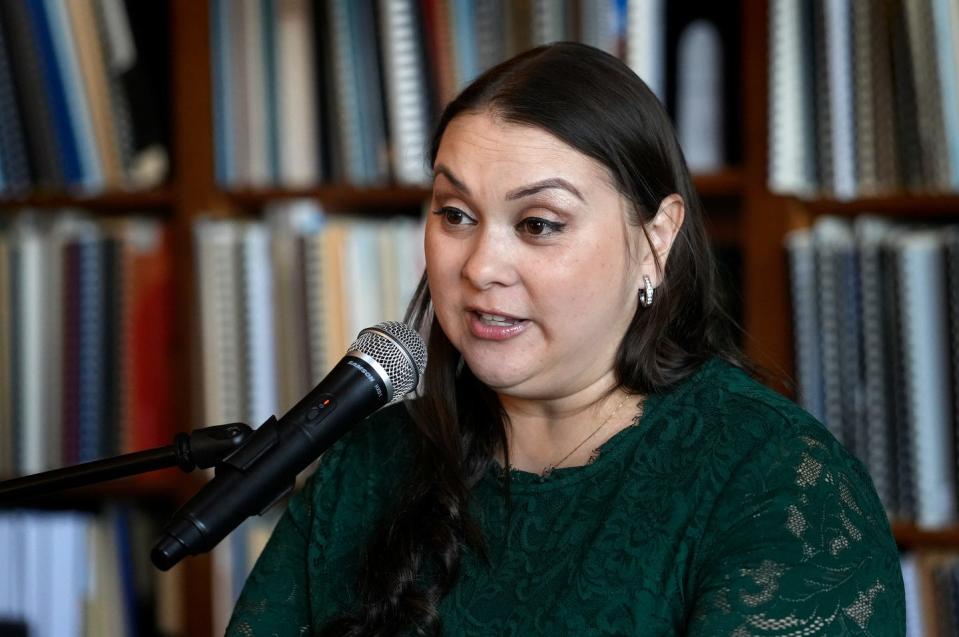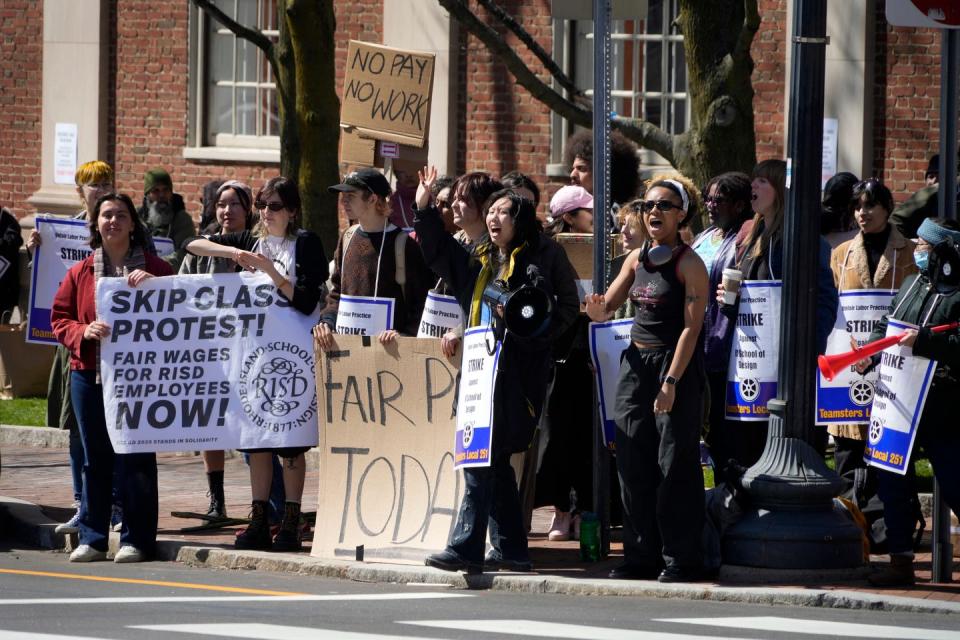What's changed (and what hasn't) in 20 years of RI politics? New book dives deep.
PROVIDENCE – Political junkies, history buffs and baffled Rhode Island newbies – this one's for you.
It's a head-to-the-beach, Del's in hand, 308-page book on "The State of Rhode Island: Politics and Government" that looks with hope, a critical eye and some regret at what's changed in the state's political culture over the last two decades – and what hasn't. (Hint: the I-know-a-guy "coziness.")
What's not to love (or hate), depending on your political bent?
Written by University of Rhode Island political science Professor Emeritus Maureen Moakley and assistant professor Emily Lynch – with essays by a number of advocates and well-known political commentators, including Providence College's Adam Myers, Brown University's Wendy Schiller and state Rep. June Speakman, a Roger Williams University professor – the book begins with this premise:
"Change has come to Rhode Island," it says, with "an increasingly diverse electorate ... more voices in the public square, the proliferation of interest groups and national political trends."
The basics for outsiders: "Little Rhody, the smallest state in the union, has a land mass of just over 1,200 square miles. North to south it is 48 miles; east to west 37 miles. With a population of just over one million, it is the second most densely populated state in the country, yet nearly 50 percent of the state is forest. It is called the Ocean State as, given its small size, it has over 400 miles of shoreline."
The authors chose this memorable moment during the roll call at the National Democratic Convention in 2020 to illustrate the "parochial ethos" that has put Rhode Island in the national news.
While "many states recorded their vote with references to historical or current political issues. The ... roll-call vote for Rhode Island featured the chair of the state Democratic Party on a beach in Rhode Island touting a plate of calamari, the state’s official appetizer, while announcing the vote."

The Washington Post described the moment as the “most irreverent” and “characteristically Rhode Island way to make an appearance on the national stage.”
"There is, however, a darker side," the authors note. "A unique degree of coziness between political leaders, labor leaders, social leaders ... [and] a legacy of political corruption."
In all, the book includes contributions from: Patrick T. Conley, Michael DiBiase, Bob Hackey, Rob Horowitz, Colleen Kennedy, Diane Kern, Aaron Ley, Emily K. Lynch, Maureen Moakley, Adam S. Myers, Shanna Pearson, Gary Sasse, Barry Schiller, Wendy J. Schiller, June Speakman, Michaela Szymczak and Matt Ulricksen.
More: Rhode Island is known as the Ocean State. How did we get the nickname anyway?
What has changed in the last 20 years?
"The immigrant experience."
Rhode Island's Latino population nearly doubled between 2010 and 2020, and Moakley wrote in one of her sections, "As one historian notes, 'For earlier immigrants, it sometimes took decades or even a century for them to become full participants in the Rhode Island community. ... Not so for Latinos.'"
"There had been pockets of Puerto Rican, Cuban and Mexican immigrants in Rhode Island, particularly in the postwar period, but a surge of Latino immigrants occurred from the 1970s to the 1990s, and in one generationthey have become a political force," she wrote.
"Minorities [currently] hold positions of influence in government, nonprofits, education and private industry, and they are becoming a respected contingent of new leaders in the state." (Cue up the bankruptcy-to-rebound story of Central Falls.)
The book estimates there are about 30,000 undocumented residents in the state – 9% of the immigrant population and 1% of the total population. Many, the book says, are from Latino communities.

In 2021, the book notes, Gov. Dan McKee signed legislation that made residents, regardless of immigration status, eligible for in-state tuition at the state colleges and universities. More recent laws provide child health care and driving privileges to those unable to establish their legal presence in the United States.
"While there are inevitable instances of drug trafficking, gangs and violent crime that accompany poverty and displacement, most of this population is generally accepted as productive," the book says. "Formerly undocumented immigrants are in the state legislature and other elected office and are productive and respected members of the political elite."
Latinos make up about 14% of voting-age adults in Rhode Island, Brown's Schiller notes, "but in terms of eligible voters, they comprise closer to 11% of the voting eligible population over age 18."
What else changed? The number of women in Rhode Island politics
"Gina Raimondo, the first elected female governor in the state, changed expectations about the capacity of elected women in public office."
And there's more, according to Schiller:
In 2003, when the legislature was downsized, "women represented just over 19% of members in the General Assembly; by 2023, women were over 44% of the legislature," with 17 out of 38 state senators, and 33 out of 75 members of the House.
"In 2021, women were over 44% of legislative membership, making Rhode Island the state with the fourth highest number female legislators in the country. In that year, women reached parity with men in the state Senate,being 50% of that body. In 2022, two of five statewide offices were held by women."
What hasn't changed?
Answer: A "back-door patronage system" that is nowhere more evident than in the appointment of magistrates to the court system, according to Moakley.
"Magistrates are appointed directly by the chief judge of each court, thus circumventing the open judicial nomination process ... which gives fits to reform groups, who call out the inside loophole in the system as a remnant of the 'I know a guy' culture in the state."
Answer #2: "The one million Rhode Islanders ... hold tightly to their hometown identities, local traditions, and local control of policy," rebuffing repeated calls for consolidation and regionalization.
"The preference for hyperlocal control is further manifested in the proliferation of dozens of other units of government ... that pull power away from the State House – from fire districts to water authorities and housing authorities," writes Speakman.
More: Does RI need 39 cities and towns? Regionalizing saves money, but it's still a hard sell
What else?
For all the changes at the State House, "Insider deals still get done; in the end-of-session rush, many insider bills are pushed through quietly, in the hopes of avoiding public scrutiny."
And, significantly: "Rhode Island is [still] a labor state."
"During the early twentieth century, labor was a powerful advocate for the rights of workers and immigrant groups that provided the labor to fuel the industrial growth that contributed to the state’s prosperity and a rising middle class," the book says.
"Private sector unions remain influential, but the power of the unions is centered in the state’s public service unions ... the thousands of state worker unions, including teachers unions and state and municipal public service unions like firefighters and police, [who] collectively wield considerable influence."

Their power "derives from the unions’ ability to influence primary elections in legislative and municipal races, where they can be a critical factor."
The book cites McKee's win in last year's Democratic primary as an example of how candidates court the union vote, in his case, by offering state workers $3,000 bonuses for being vaccinated against COVID-19. ("The blowback was considerable, so the policy was reconfigured ... as part of a retention effort to keep them on the job.")
"When the state passed pension reform, some of the more excessive aspects of union agreements involving excessive disability pension provisions and costly work allowances for public service workers were curtailed. However, many overburdened cities and towns still face costly work rules and high accumulated pension obligations," the book says.
The most glaring example: "The City of Providence has an unsustainable pension obligation of over one billion dollars."
A warning flag ahead: "Whatever the outcome [of a stalled pension-relief bond], the unions are ... confident that, while other municipalities might be forced into bankruptcy, the state would not allow the capital city to go under."
A 'laggard' compared with some blue states?
The legislature has taken on a distinctly more progressive agenda, the book says, with new progressive legislators and leaders who – while keeping a firm grip on power – are less conservative and give space and voice to members.
In his essay, Providence College's Myers cites the 2019 battle over abortion rights in the Rhode Island State House as "just one example of how Rhode Island politics and policy are highly influenced by political and policy developments" in Washington, D.C.
But he also notes the extent to which Rhode Island "lags" other blue states. Among his other observations:
Democrat-controlled states have been increasingly raising their income taxes over the last 20 years. Rhode Island, he notes, has resisted this trend. "The state’s top income tax rate is 5.99%, significantly lower than that of many leading 'Blue States' like California (top rate of 13%), New Jersey (top rate of 10.75%), New York (top rate of 8.82%), or Oregon (top rate of 9.9%)."
Rhode Island has generally moved in the same direction as other blue states, passing laws codifying abortion rights, protecting LGBTQ+ residents from employment discrimination, restricting gun access, providing driving permits to unauthorized immigrants, among other policies, but "In general, however, the state has not been at the forefront of liberal cultural policymaking," he wrote, citing gun control and marijuana legalization as arenas where Rhode Island has lagged other Democratic states.
"Given the lopsided Democratic advantage in both chambers of its legislature ... [this] may be surprising to those who are unfamiliar with the intricacies of the state’s politics," Myers writes. "But in fact, Rhode Island’s more conservative approach to cultural issues is quite easily explained by the unusually strong power of cultural conservatives within the state’s Democratic Party. Indeed, for much of the twenty-first century, the leaders of both the [House of Representatives] and Senate have been Democrats with conservative views on cultural issues."
"Whether on abortion, gay rights, or guns, these leaders have often sought to stall efforts emanating from the state’s progressive activist community to change the state’s cultural policies," he continues. "Time and again, however, political pressures have eventually forced the House Speaker and Senate President to relent."
"If and when the progressive activist community succeeds in its goal of taking over the state DemocraticParty and, with it, the General Assembly, we can expect that Rhode Island will shift from being a laggard to being a leader in Blue-State cultural policymaking."
Data points
A 2021 survey cited by URI's Lynch indicated that "a majority of Rhode Islanders follow state and local politics most of the time (60%)."
But "comparative state statistics place Rhode Island around the middle of the pack for other indicators of civic engagement." For example: "Youth engagement in Rhode Island was lower than the national rate, with 43.6% of young adults ages 18 to 29 discussing political or social issues with [a] friend or family."
Other forms of engagement, including sharing views on social media, contacting public officials and belonging to a group were also lower than the national rate.
Rhode Island recently ranked 26th for political engagement, based on voter registration, contributions and voter turnout.
Education levels for the voting-eligible population (meaning those age 18 and up): 9.4% had some high school or less, 38.4% had a high school diploma or less, 29.2% had an associate’s degree or some college, and 32.4% had a bachelor’s degree or higher, according to a 2021 analysis.
Baby boomers (born between 1946 and 1964) made up the largest proportion of voters in 2016, 2018 and 2020 and had the highest percentage of voters of their generation that turned out to vote in 2020 (77%).
This article originally appeared on The Providence Journal: New book for political junkies dives deep into state of RI politics

